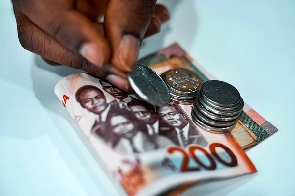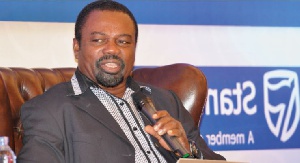More than 250 traders in Accra have benefitted from the Government’s ongoing national financial literacy campaign aimed at empowering the citizenry against fraudulent investment schemes and how to manage their finances prudently.
The programme saw representatives from various financial regulatory institutions educate the traders on beneficial investment and pension schemes that would help sustain their businesses and secure their future.
They warned the traders against falling prey to unscrupulous persons who promise insatiable and fast returns on their investments and urged them to quickly report to the appropriate institution when in doubt about any scheme sold to them.
The Government of Ghana sponsored sensitisation programme, which was done in Ga and Twi, was supported by the World Bank.
It received institutional support from the Bank of Ghana (BoG), National Pension Regulatory Authority (NPRA), National Insurance Commission (NIC), and the Securities and Exchange Commission (SEC).
Mrs Patience Arko-Boham, Chairperson, Financial Educational Multi-Stakeholder Committee explained that the programme was designed to make the populace well-informed about financial issues.
It is to also help protect depositors’ investment against unscrupulous persons, Ponzi and other fraudulent schemes and make Ghanaians their personal and business finances efficiently, she said.
Mr Andrew Ameckson, a representative from the Finance Ministry, indicated that the Government had observed over time that some people had devised schemes, including online products and services to steal from the populace, of which traders – most of whom are in the informal sector were most vulnerable.
“This situation makes our market women and other traders lose their income and sometimes, collapse their businesses, pushing them into economic hardship,” hence the financial literacy campaign, he noted.
“We’re therefore, educating Ghanaians across the country, starting with our traders in Accra, to expose them to ways of identifying investment schemes that would be detrimental to the finances and business.” Mr Ameckson said.
He urged the traders not to subscribe to schemes that promised outrageous returns (of about 50 per cent in the shortest time) and urged them to extend the education they had received to other traders.
On behalf of the traders, Mrs Deborah Freeman, General Secretary, Union of Informal Workers Association, (UNIWA), lauded the Finance Ministry for organising such an event for workers in the informal sector.
She said with the education received, she was confident that the traders would be well-informed to make the right investment and financial management decisions and withstand people who would want to rip them off their “hard earned income.”
“Money is important in both your trade, personal and family life – if you don’t educate yourself on effective management and investment, you’ll end up losing your life-time funds – so, let’s be cautious.” Mrs Freeman said.
Madam Comfort Mensah, a trader at the Makola market, said: “This programme has been beneficial to me, and likewise the other market women. There were a lot of things that I did not know but from now, I will be able to protect my money from fraudsters.”
“One thing I will do from here, is to sign onto an insurance cover so that in the case of any incident, I will have some financial cover,” she said, and urged the ministry to extend the campaign to various markets across the country.
Business News of Tuesday, 16 May 2023
Source: GNA

















